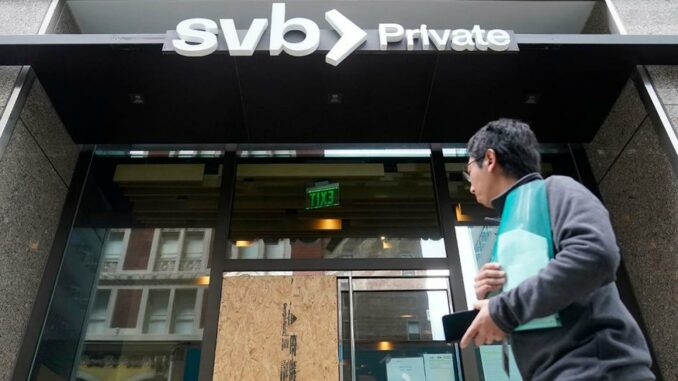
Most investments – but not all – are protected by a web of insurance
Rising interest rates can be harmful to bank earnings. Silicon Valley Bank had a large portfolio of mortgage-backed securities with very low yields. As the Federal Reserve pushed interest rates up, those securities lost value. And as depositors demanded their money back, the bank had to sell those securities at a loss.

Recessions don’t always follow bank collapses, but the recent failures of Silicon Valley Bank and Signature Bank have pushed recession fears up a few notches. For retirees, this means added worry about the safety of their money. With that in mind, let’s take some time and review the financial safety nets you have — and those you may not. Before the creation of the Federal Deposit Insurance Corporation (FDIC) in 1933, depositors often got back only pennies on the dollar — if that — when a bank failed. Today the FDIC insures most bank deposits up to $250,000. If you have more than $250,000, you can get the additional funds covered by opening an account at a different bank, or by opening a different type of account, such as an individual retirement account (IRA), at the same bank. You can find out how much of your deposits are insured through the FDIC’s Electronic Deposit Insurance Estimator.
The banking industry funds the FDIC via insurance premiums, which go into the Deposit Insurance Fund (DIF), whose assets are equal to about 1.3 percent of insured deposits. The FDIC also has a $100 billion line of credit with the U.S. Treasury in case losses exceed the DIF’s assets.
Of course, banks aren’t the only financial institutions in the world. Here are some answers to common questions about the protections you have — or don’t — in case of financial disasters. How shaky is the banking sector? It’s always a bit hard to tell: Banks can carry bad loans on their books for months before selling them off, and it takes a while for good loans to go bad in the first place. A spate of bad loans may not show up in a bank’s earnings until well after they have gone bad. Rising interest rates can be harmful to bank earnings. Silicon Valley Bank had a large portfolio of mortgage-backed securities with very low yields. As the Federal Reserve pushed interest rates up, those securities lost value. And as depositors demanded their money back, the bank had to sell those securities at a loss.
Wall Street has slashed the stock prices of many regional banks. In the past 30 days, financial stocks have fallen about 12 percent and regional bank stocks have tumbled 31 percent through March 14, according to Morningstar, the Chicago investment trackers.
At least so far, the banks’ problems seem fairly limited. The Federal Reserve Bank of New York noted in November that the banking system is well capitalized, meaning that most banks have enough reserves to weather a downturn. S&P Global Ratings noted that it has “not seen evidence that unmanageable deposit outflows experienced at a few banks have widely spread across rated banks.”
Some questions answered.
Are there uninsured banks? Yes. You can check to see if your bank is covered by the FDIC by calling the agency’s toll-free number (877-275-3342) or using its online tool. In the rare instance that your bank is uninsured, you should consider moving your money to an insured institution.
Are savings and loan associations insured by the FDIC? Yes. Savings and loan associations (S&Ls) went through a near-death experience in the 1980s and were insured by the Federal Savings and Loan Insurance Corporation. S&Ls are now fully covered by the FDIC, with the same insurance levels as
Are credit unions insured by the FDIC? No. They are insured by the National Credit Union Share Insurance Fund at the same level (up to $250,000 in deposits) as FDIC coverage.
Is my safe deposit box federally insured? No. The contents of your safe deposit boxes are not insured by the FDIC for theft or damage, and they are typically not insured by banks. You can, however, buy private insurance for safe deposit boxes.
Are people who invest directly in a bank insured? No. If you buy a bank’s stock, you’re not protected in a failure. Bonds are loans, however, and if you own a failed bank’s bonds, you may recover some of your investment in court.
Is my brokerage account federally insured? No. Most brokerages are insured by the Securities Investor Protection Corporation (SIPC) for up to $500,000 if their brokerage fails. SIPC insurance includes up to $250,000 in protection for cash in your account.
SIPC does not protect you against market losses, nor does it protect you against shysters who sell worthless securities. If a brokerage fails and you discover that some of your holdings are missing, SIPC works to replace those holdings at the current market price, which is not necessarily the same as their price when the brokerage failed.
SIPC doesn’t handle quarrels between you and your broker. That’s the domain of the Financial Industry Regulatory Authority (FINRA), the U.S. Securities and Exchange Commission or your state securities regulator.
Is my retirement account federally insured? It depends on how the money in your account is invested.
If an individual retirement account (IRA) or a 401(k) plan includes deposit accounts such as CDs and money markets held at an FDIC-covered bank, that money is insured up to $250,000 per bank.
However, most retirement accounts are made up of investment assets such as stocks, bonds and mutual funds, which the FDIC does not cover. As with standard brokerage accounts, those investments may have SIPC protection, with the limits noted above.
Is my life insurance federally insured? No. Life insurance is insured by state guaranty funds, which cover life insurance policies and annuities if the insurer goes out of business. Laws vary by state, but most offer at least $300,000 in life insurance death benefits and long-term care policies. Annuities are covered up to $250,000.
State guaranty pools are funded by the companies that sell policies in that state. You can find your state guaranty association through the National Organization of Life and Health Insurance Guaranty Associations.
Is my cryptocurrency federally insured? No. If your crypto gets stolen, there’s no FDIC, credit card issuer or bank to make you whole. Your money is gone.
(John Waggoner covers all things financial for AARP, from budgeting and taxes to retirement planning and Social Security. Previously he was a reporter for Kiplinger’s Personal Finance and USA Today.)
(Source: AARP)





Be the first to comment